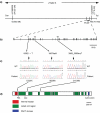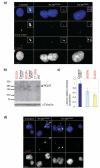Mutations in pericentrin cause Seckel syndrome with defective ATR-dependent DNA damage signaling
- PMID: 18157127
- PMCID: PMC2397541
- DOI: 10.1038/ng.2007.80
Mutations in pericentrin cause Seckel syndrome with defective ATR-dependent DNA damage signaling
Abstract
Large brain size is one of the defining characteristics of modern humans. Seckel syndrome (MIM 210600), a disorder of markedly reduced brain and body size, is associated with defective ATR-dependent DNA damage signaling. Only a single hypomorphic mutation of ATR has been identified in this genetically heterogeneous condition. We now report that mutations in the gene encoding pericentrin (PCNT)--resulting in the loss of pericentrin from the centrosome, where it has key functions anchoring both structural and regulatory proteins--also cause Seckel syndrome. Furthermore, we find that cells of individuals with Seckel syndrome due to mutations in PCNT (PCNT-Seckel) have defects in ATR-dependent checkpoint signaling, providing the first evidence linking a structural centrosomal protein with DNA damage signaling. These findings also suggest that other known microcephaly genes implicated in either DNA repair responses or centrosomal function may act in common developmental pathways determining human brain and body size.
Figures




References
-
- Majewski F, et al. Studies of microcephalic primordial dwarfism I: approach to a delineation of the Seckel syndrome. Am J Med Genet. 1982;12:7–21. - PubMed
-
- Seckel HPG. Bird-headed Dwarfs: Studies in Developmental Anthropology Including Human Proportions. Springfield, Illinois: Charles C Thomas; 1960.
-
- Alderton GK, et al. Seckel syndrome exhibits cellular features demonstrating defects in the ATR-signalling pathway. Hum Mol Genet. 2004;13:3127–38. - PubMed
-
- O'Driscoll M, et al. A splicing mutation affecting expression of ataxia-telangiectasia and Rad3-related protein (ATR) results in Seckel syndrome. Nat Genet. 2003;33:497–501. - PubMed
-
- Diviani D, et al. Pericentrin anchors protein kinase A at the centrosome through a newly identified RII-binding domain. Curr Biol. 2000;10:417–20. - PubMed
Publication types
MeSH terms
Substances
Associated data
- Actions
Grants and funding
LinkOut - more resources
Full Text Sources
Other Literature Sources
Molecular Biology Databases
Research Materials
Miscellaneous

